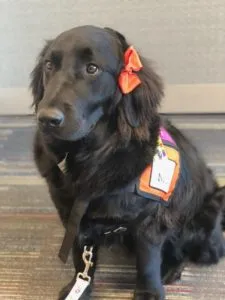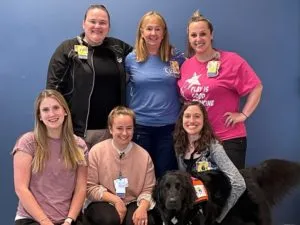Child Life Specialists: Heroes Among Us

Heading to the hospital with your child? Maybe they need an IV placed or need to stay as an inpatient for a few days? Both you and your child are probably pretty stressed about the whole thing. But help is on the way! Our Children's Medical Center has certified child life specialists to help your family cope with a potentially stressful health care experience.
So … what is a child life specialist? According to the Association of Child Life Professionals, these heroes among us help infants, children, youth, and families cope with the stress and uncertainty of illness, injury, trauma, disability, loss, and bereavement. They provide appropriate interventions, including therapeutic play, preparation for procedures, and education to reduce fear, anxiety, and pain. They also have a bachelor’s or master’s degree.
It’s probably best to show you what they do by showing you what a typical day looks like for our child life team.
A Day in the Life of a Child Life a Specialist

8 am: (Rachel) Pup Rounds. We join the medical team to learn about each patient’s care plan for the day. We also meet as a team in the mornings to talk about upcoming events. This week is St. Patrick’s Day, so plans are underway to celebrate the luck of the Irish and how we can brighten the day with a little green and gold.
8:15 am: (Meghan) Good morning Valentina! She’s our animal therapy dog and has her own social media channel @umass_supaw_stars. Wherever we’re needed, I’ll take Valentina to provide comfort and distraction to patients. We also have volunteers who bring in their dogs for therapy.
9:20 am (Tracie) Time to meet the parents of an 8-year-old surgery patient. Lilly is having her hernia repaired, so I was able to explain to her in simple terms what will happen using medical play and a medical doll. When we do this, we try to engage the patients’ senses – what they will see, what they will hear, who will be in the room.
10:30 am: (Katie) I brought some of our inpatients to the playroom for music therapy. Music therapy is a technique that is used to encourage expression and reduce pain. It also helps to celebrate milestones. As a music therapist, I also record patients’ heartbeats to create unique pieces of music.
10:45 am: (Dawn) I’m headed to the ED for a trauma. In the ED, child life specialists identify the patient’s immediate needs. It could be pretty stressful as you can imagine. I help lessen anxiety and stress through emotional support, information sharing, and coping interventions, such as distraction and imagery. But it doesn’t end there. I also work with the family - supporting the whole unit.
1:30 pm: (Hannah) Cameron, who is being treated for leukemia has been in the hospital for three weeks. I’m getting him set up for his tutor appointment. He loves math and science. Valentina is coming for a visit too. Cameron has a soft spot for her.
1:50 pm: (Jackie) It’s birthday time. One of my patients is celebrating his 16th birthday. I found the perfect gift for him and had our staff sign a card. It’s not a party at home, but our child life specialists do our best to make the environment more fun.
2:10 pm: (Nicole) I have a patient who is going to have a spinal tap done. Both she and her mom are very nervous. I met with them last week to see what their needs were to get them through this process. We worked together to create a plan. This involvement gives them a chance to become part of the process and have a voice. I also use the opportunity to dispel any myths they might have about the process or what will happen. Both mom and child will do great.
3:20 pm: (Micaela) I work in the Pediatric Intensive Care Unit, also called the PICU. One of the nurses let me know we have a little boy who was in a car accident. He’s very scared and could use some support. I’m heading there now to assess the situation, talk to the guardians and see how we can try to make it less scary for him. Oftentimes, playing and engaging with patients allow them to explore feelings and concerns, and build trust.
4:05 pm: (Ashlynn) I went to our outpatient clinic for a chemotherapy infusion. Mateo hates needles. Our child life specialists are trained to help patients focus on something else to help them cope with the fear of getting a shot or IV.
5:30 pm: (Elena) One of our inpatients, Ali, is being discharged today. Before I head home, he’ll get a tour of the outpatient clinic for his follow-up appointment for Type 1 diabetes.
Thanks to our child life team members for sharing how they spend their time helping patients. For most of you, child life will be something you’re just learning about. If you have children or grandkids, nieces, or nephews needing hospital care, ask how child life services may be helpful.

*Names within our story don’t represent real patients.
Related:
Other related articles by:
animal therapy | child life | children | Children's Medical Center | hospital visit | infant | music therapy | school age | teens | toddlerNote: The content of this blog is for informational purposes only. It is not intended for use as diagnosis or treatment of a health problem or as a substitute for the professional consultation of a physician or qualified health care provider. If you have specific questions or concerns regarding a health or medical condition, contact your physician or a licensed health care professional.

